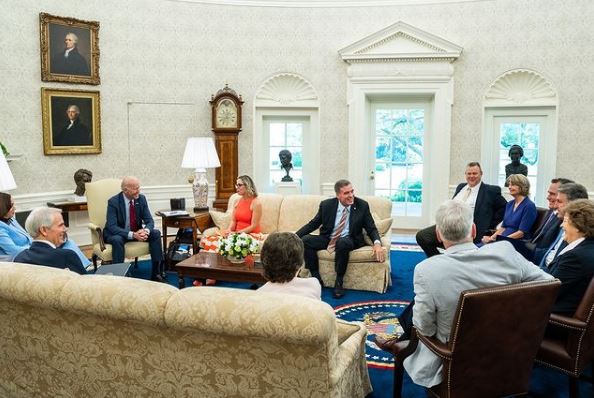Biden Tosses Republicans a Meager ‘Bipartisan’ Infrastructure Bone as He and Democrats Prepare to Go Alone on a Much Bigger Plan
Washington must think we’re dumb, numb or just not paying attention.
There’s President Joe Biden standing with the self-appointed congressional centrists to announce there is a landmark bipartisan deal on infrastructure. Except it turns out that they don’t have it.
The deal is to pass a bipartisan bill that gives half the loaf Biden promised. But then Biden tells us that he won’t sign the deal unless Congress approves the larger, and probably more appropriate, funds separate from this bipartisan process. He is relying on the arcane reconciliation clause that lets 51 Democrats, including Vice President Kamala Harris, approve spending with no Republican votes.
If you’re keeping a scoresheet on all this:
- Senate Minority Leader Mitch McConnell, R-Ky., calls Biden two-faced and says he may still oppose all of the proposals for infrastructure.
- House Speaker Nancy Pelosi, D-Calif., says her slim Democratic majority won’t even vote on the compromise until the Senate has approved both of the infrastructure measures, the parts covered by bipartisanship and the parts opposed by Republicans, by any means.
- And anyone who can count can see that the photo op to hail bipartisanship has five Republican senators lined up, not the 10 needed to pass anything through the Senate’s 60-vote requirement.
So, again, is this a deal? A partial deal? A sham?
As The Washington Post summarized, if passed, the $973 billion bipartisan agreement to fund roads, bridges, pipes, transmission lines and broadband over five years will be the largest package of spending on the country’s infrastructure in years.
“It also would show that Biden has found a way to bridge a divided Washington — at least on the popular issue of spending money on construction — and,” said The Post, “achieve an agreement that eluded his predecessor, whose frequent promises to focus on infrastructure became a running joke in Washington.”
But all the stuff not included – from climate change to human infrastructure support – would have to come in a bill that will receive a reaction that is distinctly not bipartisan.
As well as investments in alternative energy jobs and production, that would include programs considered liberal such as subsidizing healthcare workers, extending direct child-care payments to families and cutting college costs.
Promises of Bipartisanship
Yes, Biden had a central campaign pledge to make the country’s legislative system work again, however a longshot that thinking was. And that the Biden agenda is being cornered by the likes of Sen. Joe Manchin, D-W.Va., and allies even among the Democrats alone.
But if you’re going to make a bipartisan deal by throwing out tons of your proposal just to make a point of bipartisanship, what are we supposed to make of announcements that are a sorta deal, so long as you do what you were going to do all along?
Mr. President, senators, color me confused. Is any bridge going to get fixed this year? Are we going to repair potholes but not child care?
I see Biden and the senators taking a political kumbaya photo-op moment in the name of getting along at any cost and then also seeming to stand for insistence on what Biden wants, how he wants it.
And virtually simultaneously, we’re being presented with the inevitable political polls that show Biden at a 56% approval rate for bipartisan posturing while every Republican in sight and Fox News are overflowing with insulting invective about Biden’s every breath and statement.
The New York Times saw some kind of strange political upside of a two-sided approach. “It is an attempt for the president to have it both ways — compromising with Republicans in pursuit of a bold and progressive agenda — just as he promised Democratic voters he would during the 2020 primary campaign. . . while promising liberals that the agreement will not become law unless his party’s moderates also supply votes for a far more expensive companion plan. At its core, it is a risk. Biden’s two-track strategy could easily collapse before any infrastructure bills get to his desk, leaving him empty-handed on his top domestic priority.”
It seems a weird way to govern, but a weirder way to line up support from you and me.
Keeping Track
It’s hard enough to keep track of these guys when they talk straight, never mind when there are supposed to be multiple simultaneous messages.
We were seeing Vice President Kamala Harris go to the border to pronounce things bad, but not as bad as under Donald Trump. Meanwhile, Trump is taking a group of Republican senators to the border in the next days to say the opposite. No matter what Harris or Trump says, it is not true that everything is hunky-dory at the border, nor is it true that Biden has thrown the borders wide open.
What people will accept is that we have a set of government policies in place that are doing what is intended. In this case, we are applying stringent border protection with room for the compassion for fleeing children that we associate with general American values.
What we don’t need is a fight over the facts on the ground. Both sides ought to be able to agree on the nature of the problem, whether it is immigration or infrastructure, even if they disagree about what to do about it.
What we have a harder time accepting is public announcements that there is a deal in place – or that one side has rolled the other to force a deal – so that we can get on with whatever the policy is supposed to affect. Hearing that we have a deal when we don’t doesn’t let us plan for getting anything done.




